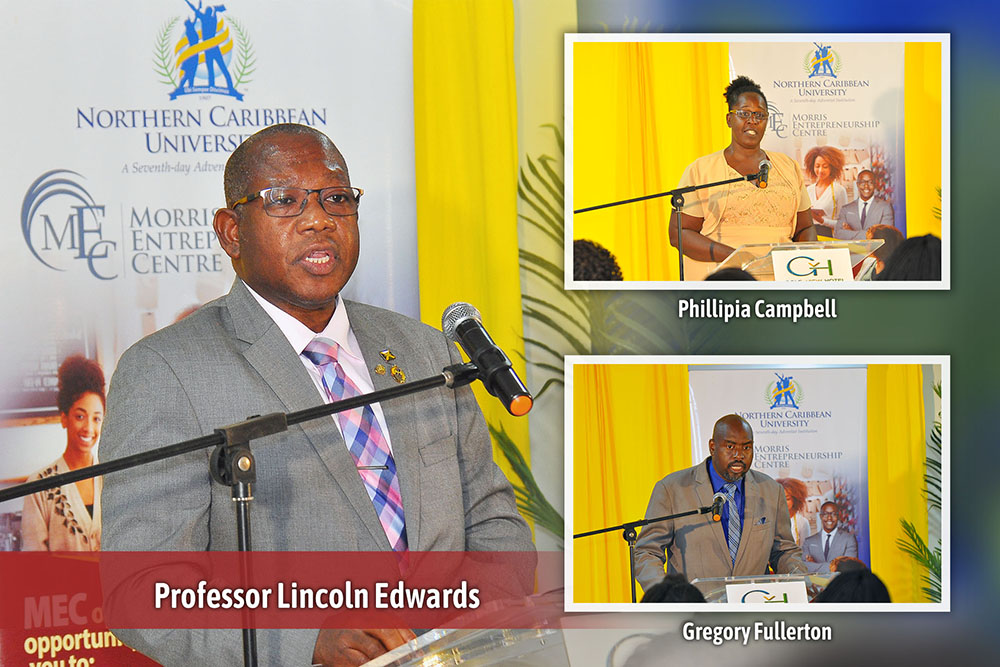President of Northern Caribbean University (NCU), Professor Lincoln Edwards has called for more empowerment of small farmers in Jamaica by the government and other stakeholders, especially in light of global threats to food security.
“Government agencies and private sector companies that relate to agriculture in Jamaica, you know the challenges faced by Jamaica’s small farmers, let’s work together to fix it,” implored Professor Edwards while delivering the keynote address at the graduation of 50 small farmers from the United States Embassy-funded Small Farmers Digitalisation Programme on September 28, 2022.
Speaking under the theme Embrace Technology for Business Growth, Professor Edwards advised that digital training and other support for small farmers were part of a national solution to Jamaica’s food security issues in light of the impact of global political tensions and environmental issues. He highlighted the need for Jamaica small farmers to be equipped to help the nation feed itself and advance its economy.
“We know prophetically that the food situation globally is going to continue to become more challenging as the years pass. So, you are helping the nation satisfy its urgent food security needs and you will do that even better when you return to your farms and your communities and use the skills you learnt in this digitalisation training programme,” Professor Edwards told the graduates, who were dominantly females.
The NCU president challenged the government and other stakeholders to do more to assist small farmers with training, extension services, data protection and mobile broadband technology. These, he said, were all needed by small farmers for them to benefit from reduced work hours and workload, and to experience sustainability and profitability.
The training of the small farmers was conducted by the MEC at NCU starting in October 2021. The trainees were exposed to agricultural-based entrepreneurship and digital technology. Participants acquired basic and advanced computer skills and learnt how to use their smartphones to manage their businesses. Networking partner, Louisiana State University, was also involved in the training. During the period of training, the farmers also registered their farming businesses.
Executive Director of the Morris Entrepreneurship Centre (MEC), Hazel O’Connor, expressed delight in the success of the project.
“Over the course of the programme, we have seen tremendous growth in the farmers, especially as it relates to their approach to farming as a viable commercial venture. We continue to actively work with our clients to provide customised solutions to help them build and grow their businesses”, Mrs O’Connor said.
Small farmer Gregory Fullerton said, “This programme was designed to be very informative, easy to understand and very beneficial to my journey in life. I would highly recommend it to any other persons who are interested in getting the tools to advance in this digital future – it is a beautiful programme.”
Phillipia Campbell, owner of Fields, Farms and Services, expressed her excitement at being a student of NCU through the MEC small farmer digitalisation programme. “Our facilitators were great. They explained everything down to the T”, she recounted.
She added: “The marketing aspect was very eye-opening for me as well because it has encouraged me to find other ways to promote my farm. In addition, whatever I learnt at the computer training has also helped me with my record keeping”.
The NCU president also used the occasion to establish the history and involvement of NCU in agriculture, including:
- Over the past 20 years, the university has engaged in agricultural events and has hosted agricultural symposia like the Youth in Agriculture Symposium of February 2020.
- Research and innovation in agriculture by NCU Faculty has helped Jamaica. For example, research by Mrs Deshaun Martin-Clarke has led to the “Pest Forecasting System” that now assists in fighting beet armyworm infestations.
- In 2009, NCU third year students entered the Imagine Cup Software competition in Cairo, Egypt. They became finalists with their poverty and hunger eradication Resource Access Intelligent Network (RAIN) solution project.
Offering commendation to the at farmers the event, were Fredrica Webster, parish manager of the Human Employment and Resource Training Trust/National Service Training Agency (HEART Trust/NSTA); Simone Spence-Johnson, president of the Manchester Chamber of Commerce; Anthony “Tony” Freckleton, Chair of the Manchester Development Committee; and Winston Miller, parish manager, Rural Agricultural Development Authority (RADA).
Written by Shannette S/CCMPR



No responses yet